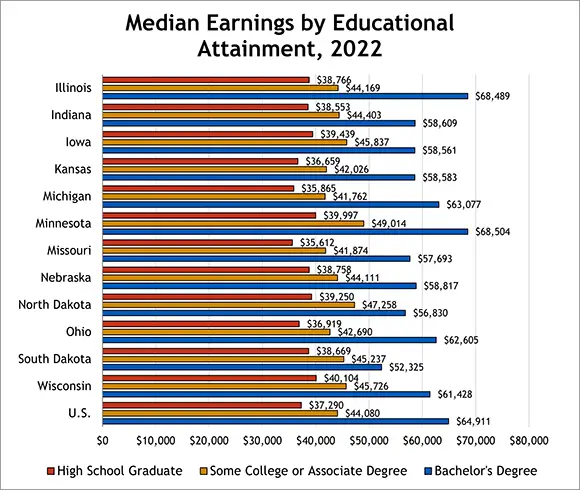MHEC News December 2023
Greetings,
The end of the year is near, but before the calendar turns to 2024, MHEC has one more great opportunity tomorrow. Register now to join the Tuesday, November 12, conversation Stronger State Community College Finance as a Lever for Student Success. MHEC is collaborating with HCM Strategists and the Community College Research Center for this event. See below for additional December highlights:
- Policy & Research: Median Earnings by Educational Attainment, Higher Education in Prison, and Open Educational Resources (OER) Course Marking
- Convenings: Community College Finance, Cybersecurity, and OER Course Marking
- Programs: NC-SARA Student Complaints Dashboard and Policy Modification Process
Thank you to our commissioners and advisory committees for another successful year.
The MHEC team sends warm wishes to you for a joyous holiday and looks forward to serving you and our member states in 2024! As always, the Compact welcomes your feedback and suggestions.
Policy & Research
College Wage Premiums Vary Across Midwestern States
The latest update to MHEC’s Interactive Dashboard shows that the median earnings of adults who completed some college credit or an undergraduate credential were consistently higher than the median earnings of high school graduates across all Midwestern states in 2022. The earnings difference between adults with a high school diploma and those with some college credit (including a certificate) or an associate degree ranged from $5,353 in Nebraska to $9,017 in Minnesota, compared to the national average of $6,790. The earnings difference between adults with a high school diploma and those with a bachelor’s degree was even greater, ranging from $13,656 in South Dakota to $29,723 in Illinois, compared to the national average of $27,621.
This indicator shows median earnings among adults ages 25 and older with earnings over the previous 12 months whose highest level of education is a high school diploma (including equivalency), some college credit (including a certificate) or an associate degree, or a bachelor’s degree.
MHEC’s Interactive Dashboard provides additional ways to visualize this data using bar charts, line graphs, maps, and tables. Selected benefits indicators are also available for MHEC states in the report Higher Education in Focus.

New England Board of Higher Education Extends Invitation to Participate in National Conference on Higher Education in Prison
The New England Board of Higher Education (NEBHE) extended an invitation to MHEC staff to learn about the New England Commission on the Future of Higher Education in Prison. Beth Ellie, MHEC associate director of policy initiatives, participated in the 13th National Conference on Higher Education in Prison (NCHEP) November 9-11, in Atlanta, Georgia. The Alliance for Higher Education in Prison hosted the convening.
The New England commission, consisting of 83 members across diverse sectors, aimed to improve the quality of postsecondary education in prisons. Its approach focused on areas such as credential completion, reducing time to degree, and fostering labor market success and upward socioeconomic mobility for incarcerated individuals. To implement these goals, the commission issued 15 recommendations covering both prison-based and community-based initiatives at the state and regional levels. These findings are included in the 2023 report Partnerships for Progress in New England: A Student-Centered Approach to Higher Education in Prison. The significance of prison education was underscored by insights from the Vera Institute of Justice, citing that participants in higher education in prison programs have a 48 percent lower likelihood of recidivism. Considering that 95 percent of incarcerated individuals eventually return to their communities, postsecondary education in prison emerges as a critical factor in securing life-sustaining employment upon reentry.
MHEC will explore regional interest in this topic in 2024.
Open Educational Resources Course Marking Report Released

The survey included questions related to institutions’ and systems’ course marking processes, data validation processes, use of course marking data, technology use, and motivations for course marking of OER. The authors conclude that institutions and systems are successfully implementing OER course marking processes and using the data in ways that help students and the institutions and systems make data-informed decisions.
Convenings
Stronger State Community College Finance as a Lever for Student Success
Tuesday, December 12 | 9:00 a.m. CT
Join us for a conversation with HCM Strategists and the Community College Research Center (CCRC) about community college finance systems and the impact of the incentives they drive. The webinar will present findings from a recent report released by these research partners, which maps the community college finance systems in California, Ohio, and Texas. HCM identified and analyzed the policies that control each state’s major revenue streams, their implications for institutional behavior, and their effects on equity. Additionally, CCRC researchers will present findings from an institutional analysis conducted at eight community colleges across these three states.
Moving Cybersecurity from ‘Unfunded Mandate’ to Strategic Advantage
Thursday, February 1 | 11:00 a.m. CT
Join MHEC for a fireside chat about how higher education institutions can turn cybersecurity from a burden to a strategic advantage. Escalating risks, proactive mitigation strategies, attacker methods, risk minimization techniques, and compliance strategies will be discussed, in addition to emerging trends that help leaders improve their cybersecurity capabilities.
Findings of the OER Course Marking Landscape Analysis Survey
Thursday, February 8 | 11:00 a.m. CT
This webinar will highlight the findings of the Open Educational Resources (OER) Course Marking Landscape Analysis Survey, administered in May 2023. Course marking is when institutions create indicators in course catalogs that let students know the cost of their textbooks and learning materials at the time of registration so they can anticipate the full cost of postsecondary attendance for a semester. The survey was designed to explore course marking related to OER and no-/low-cost course materials. Learn about efforts to explore further the collection and use of course marking data.
Resources Available from Past Events
Midwest Credential Transparency Alliance: Building Pathways for States and Regions Through the Midwest Credential Transparency Alliance (MCTA), MHEC and Credential Engine are collaborating to promote credential transparency within Midwestern states and across the region. The [Pathway Builder tool <https://credentialengine.org/pathwaybuilder>] , offers a user-friendly interface that allows stakeholders to construct pathways, incorporating data from the Credential Registry and accommodating pathways of varying complexity. A demonstration of the tool is provided in this recording.
Are You Ready? New Licensure Regulations Significantly Impact Student Enrollment, Curriculum Development, and Staff/Faculty Workloads The U.S. Department of Education released the final version of Title IV Certification Procedures regulations in late October. These regulations include an expansion of professional and occupational licensure-related responsibilities for institutions, with the need to certify that programs satisfy all educational prerequisites for licensure where students are located. As a result, institutions will need to limit enrollment in certain states, and/or revise curricula to meet specific licensure requirements. In this recording, the Higher Education Licensure Pros LLC shared information about the new regulations, the impacts on institutions, and how to best prepare for the July 1, 2024, effective date.
Programs
State Authorization Reciprocity Agreement (SARA) Updates
An improved Student Complaints Dashboard is now available. Direct questions or suggestions to the National Council for State Authorization Reciprocity Agreements (NC-SARA).
NC-SARA has also made available resources from the 2023 SARA Policy Modification Process and has a draft calendar for 2024 available.
Team Updates
State Visits 2024
Susan Heegaard, president, w ill testify before the South Dakota Joint Committee on Appropriations on January 22. South Dakota will be the first state visit in 2024. While in MHEC member states she will meet with higher education legislative, and executive branch leadership. She will be joined by executive officers, and Rob Trembath, chief operating officer and general counsel.
Journal of Education Finance
Aaron Horn, associate vice president of research, and Shaun Williams-Wyche, associate director of research and data analysis, were published in the Journal of Education Finance for their collaboration on The Effect of State Appropriations on College Graduation Rates of Diverse Students.
Complete College America
Beth Ellie, associate director of policy initiatives, attended the Complete College America Annual Conference on December 10-13, in Las Vegas. This year’s conference theme Future Ready, provides a focus for higher education leaders, practitioners, and policymakers and how they are looking to the future on affordability, equity, emerging technologies, and changing political landscapes.

